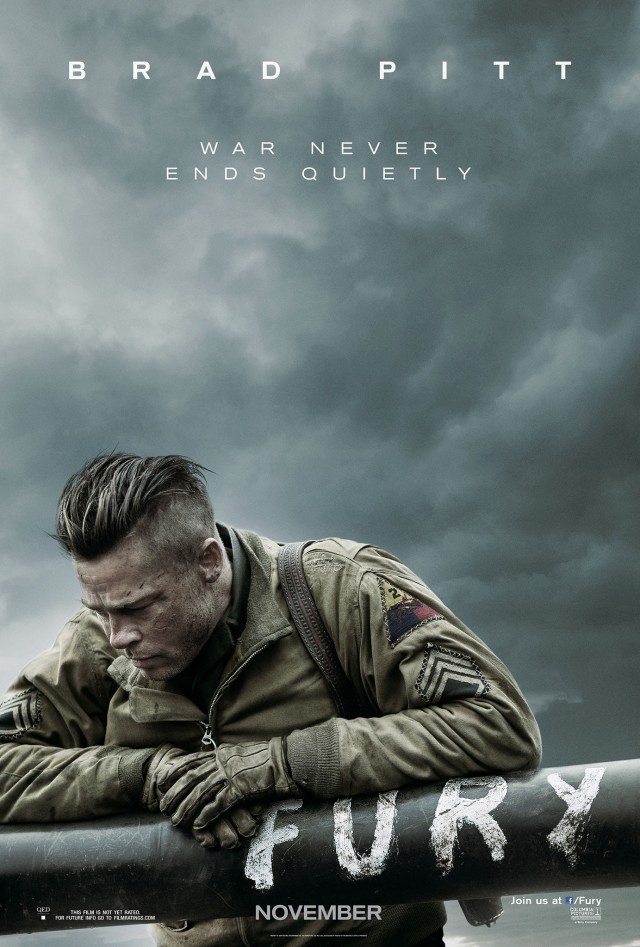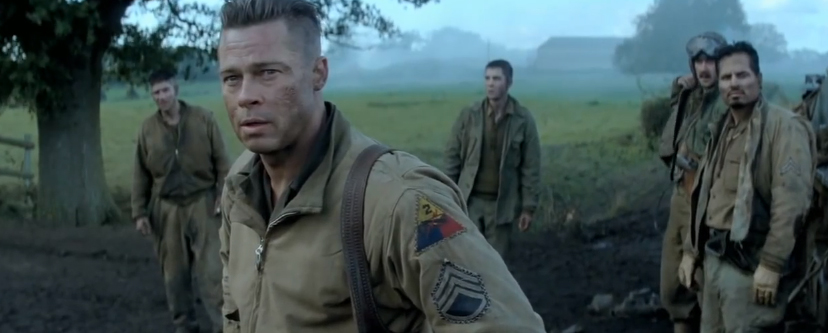Michael C here wondering if we are ever going to get more films about 20th Century conflicts other than World War 2? How long has it been since we've had a solid Vietnam film? Did Three Kings and Jarhead say all there was to say about the first Iraq war?
 At this point, it feels like there are enough World War II movies to reconstruct something close to the entirety of the conflict, across all theaters of operation. Audiences can be forgiven if the appearance of yet another crew of hard-bitten soldiers marauding through the German countryside in David Ayer’s Fury strikes us as more than a bit superfluous. The difference this time is that Fury wants to strip away the gauzy Greatest Generation glow that has diminished other depictions of this subject matter. No American flags flapping in the wind, no swells of violins, no famous battles. Just the anonymous, grisly work of tank combat in the waning days of the war, where the only task left is to feed enough of the remaining enemy into the meat grinder to hasten the inevitable German surrender.
At this point, it feels like there are enough World War II movies to reconstruct something close to the entirety of the conflict, across all theaters of operation. Audiences can be forgiven if the appearance of yet another crew of hard-bitten soldiers marauding through the German countryside in David Ayer’s Fury strikes us as more than a bit superfluous. The difference this time is that Fury wants to strip away the gauzy Greatest Generation glow that has diminished other depictions of this subject matter. No American flags flapping in the wind, no swells of violins, no famous battles. Just the anonymous, grisly work of tank combat in the waning days of the war, where the only task left is to feed enough of the remaining enemy into the meat grinder to hasten the inevitable German surrender.
It's a compelling argument for Fury's existence, at least for the first half of the film. As the tank rolls along, however, Fury surrenders its attempts to navigate the harsh no man’s land where ethics and war collide. What began as a corrective against the false comfort of your granddaddy’s war films morphs into a compilation of war movie clichés, complete with characters dying in order of billing, and glorious hero shots of doomed last stands against impossible odds. By the end it’s Frank Miller’s 300 with tanks.
“Ideals are peaceful, history is violent,” says Brad Pitt's weathered tank commander Wardaddy.

He is speaking to Norman (Logan Lerman), the green new soldier who was training to be a typist before being thrust into the position of gunner on Pitt’s crew of hard-asses. At first, Norman seems like he’s cut from the same cloth as Jeremy Davies’ meek corporal from Saving Private Ryan, but the crucial difference is that his failure to act when the Nazis are in the crosshairs is not a failure of will, but a matter of principle. Norman simply refuses to kill. When Pitt orders Norman to shoot a Nazi prisoner in the back to disabuse him of the idea that pacifism is a workable philosophy on the front line, Norman won't budge, going so far as to volunteer to have Pitt shoot him rather than have Pitt force him to gun a man down.
For a few scenes it looks like this confrontation between Norman’s youthful idealism and Wardaddy’s hard-won pragmatism will be the crux of the movie, but unfortunately Fury can’t sustain the tension. Norman’s principles crumble almost immediately upon witnessing first hand evidence that, yes, it turns out the Nazis are monstrous. In no time at all he is gunning down Germans with more zeal than anyone. No doubt Ayers intends this to be a statement on the untenable nature of moral stands in a war zone, but brushing aside the conflict with such ease grants no weight to that which has been lost. It is not a collapse of Norman’s humanity but a case of a naïve kid who needs to man up and shoot the bad guys. Good advice, perhaps, but hardly the poetic statement about the dehumanizing power of war at which Fury appears to be aiming.
On the other hand, once one surrenders the idea this is going to be a serious meditation on combat, some sort of Thin Red Line with added exploding heads, Fury settles in to being pretty effective action movie. Before Fury, I would have thought I had seen enough World War II battle scenes to last a lifetime, but I would’ve been wrong. Around the halfway mark Ayer delivers what is probably the best action sequence I’ve seen all year, a thrilling one-against-three tank battle over open terrain. It’s one of those movie scenes that make you exclaim, “I’ve never seen that before!” Even the big action finale where the wounded tank holds its ground alone against hundreds of SS officers makes for a magnificent spectacle, provided you can ignore the fact that it breaks with the reality of everything that preceded it.

So does one fault Fury for failing to live up to its lofty aspirations or give it a pass for what it ended up being: an engaging actioner with more on its mind than most films? I lean towards the former, if only because Fury casts off so much in terms of character and story in service of maintaining a narrow, bleak vision that never pays off much. The actors are all playing characters as one-note as their nicknames, even if they are all skilled at making you overlook that, particularly Pitt, who is all restrained intensity and muted charisma, and Shia LeBeouf who does an impressive amount of silent character building with his underwritten role.
During the extended slaughter in the film’s final stretch Fury’s drab khaki and mud color palette final opens up as fire torches the sky a burning blood red. It’s a vision of Hell, but also an indication that the Fury's true heart lies not with the moral complexity of its early scenes, but with the visceral simplicity of the carnage.
Grade B-
Oscar Chances: A definite contender in all the aural categories, which always love a good battle scene, and an outside chance in visual categories like Production Design and Costumes although I'm wagering it won't have the voter enthusiasm to win out over more popular choices. Despite grand ambition Fury doesn't have the substance to compete in the Top 8, although if Supporting Actor remains wide open I suppose you couldn't 100% rule out Pitt or Lerman breaking in (although I would classify them as co-leads)